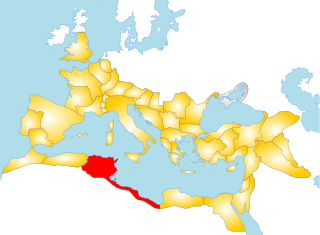Related Research Articles
Ṭāriq ibn Ziyād, also known simply as Tarik in English, was a Berber commander who served the Umayyad Caliphate and initiated the Muslim Umayyad conquest of Visigothic Hispania in 711–718 AD. He led a large army and crossed the Strait of Gibraltar from the North African coast, consolidating his troops at what is today known as the Rock of Gibraltar. The name "Gibraltar" is the Spanish derivation of the Arabic name Jabal Ṭāriq, meaning "mountain of Ṭāriq", which is named after him.

Ifriqiya, also known as al-Maghrib al-Adna, was a medieval historical region comprising today's Tunisia and eastern Algeria, and Tripolitania. It included all of what had previously been the Byzantine province of Africa Proconsularis and extended beyond it, but did not include the Mauretanias.

The Zirid dynasty, Banu Ziri, or the Zirid state was a Sanhaja Berber dynasty from modern-day Algeria which ruled the central Maghreb from 972 to 1014 and Ifriqiya from 972 to 1148.
Abū al-ʽAbbās Aḥmad ibn Muḥammad ibn ʽIḏārī al-Marrākushī was a Moroccan historian of the late-13th/early-14th century, and author of the famous Al-Bayan al-Mughrib, an important medieval history of the Maghreb and Al-Andalus written in 1312.
Abd al-Aziz al-Fishtali, fully Abu Faris 'Abd al-'Aziz ibn Muhammad ibn Ibrahim al-Sanhaji al-Fishtali was a Moroccan writer, head of the chancery, official historiographer and official poet of the Sultan Ahmad al-Mansur.
Abū al‐Ṣalt Umayya ibn ʿAbd al‐ʿAzīz ibn Abī al‐Ṣalt al‐Dānī al‐Andalusī, known in Latin as Albuzale, was an Andalusian-Arab polymath who wrote about pharmacology, geometry, Aristotelian physics, and astronomy. His works on astronomical instruments were read both in the Islamic world and Europe. He also occasionally traveled to Palermo and worked in the court of Roger I of Sicily as a visiting physician. He became well known in Europe through translations of his works made in the Iberian Peninsula and in southern France. He is also credited with introducing Andalusian music to Tunis, which later led to the development of the Tunisian ma'luf.
Abū Isḥāq Ibrāhīm ibn al-Qāsim al-Raqīq al-Qayrawānī was a courtier and author in the court of the Zirids in Ifriqiya. He is usually known as Ibn al-Raqīq, al-Raqīq al-Qayrawānī or even just al-Raqīq.

Abū Muḥammad ʿIzz al-Dīn ʿAbd al-ʿAzīz bin ʿAbd al-Salām bin Abī al-Qāsim bin Ḥasan al-Sulamī al-Shāfiʿī, also known by his titles, Sultan al-'Ulama/ Sulthanul Ulama, Abu Muhammad al-Sulami, was a famous mujtahid, Ash'ari theologian, jurist and the leading Shafi'i authority of his generation. He was described by Al-Dhahabi as someone who attained the rank of ijtihad, with asceticism and piety and the command of virtue and forbidding of what is evil and solidity in religion. He was described by Ibn al-Imad al-Hanbali as the sheikh of Islam, the imam of the scholar, the lone of his era, the authority of scholars, who excelled in jurisprudence, origins and the Arabic language, and reached the rank of ijtihad, and received students who traveled to him from all over the country.
Ḥasan ibn Qatādah ibn Idrīs al-Ḥasanī was the Emir of Mecca from 1220 to 1222.
Jammāz ibn al-Ḥasan ibn Qatādah ibn Idrīs al-Ḥasanī was Emir of Mecca for a few months from 1253 to 1254.
Ghānim ibn Rājiḥ ibn Qatādah ibn Idrīs al-Ḥasanī was Emir of Mecca for part of 1254. He assumed the Emirate in Rabi al-Awwal 652 AH after deposing his father Rajih without resistance. He reigned until Shawwal when he was defeated by Idris ibn Qatadah and Abu Numayy ibn Abi Sa'd.
Idrīs ibn Qatādah ibn Idrīs al-Ḥasanī was Emir of Mecca from 1254 to 1270, with interruptions. The majority of his reign was in partnership with his grandnephew Abu Numayy ibn Abi Sa'd ibn Ali.
Umm Mallal, known as al-Sayyida (princess), was a Zirid princess and a regent of the zirid dynasty for her nephew Al-Mu'izz ibn Badis between 1016 and 1023.
Abū 'Abd Allāh Muḥammad ibn 'Imrān ibn Mūsā ibn Sa'īd ibn 'Abd Allāh al-Marzubānī, was a prolific author of adab, akhbar (news), history and ḥadīth (traditions). He lived all his life in his native city, Baghdad, although his family came originally from Khurāsān.
Abū Bakr al-Zubaydī, also known as Muḥammad ibn al-Ḥasan ibn ‘Abd Allāh ibn Madḥīj al-Faqīh and Muḥammad ibn al-Ḥasan al-Zubaydī al-Ishbīlī, held the title Akhbār al-fuquhā and wrote books on topics including philology, biography, history, philosophy, law, lexicology, and hadith.
Hubayrah ibn Sabal ibn al-‘Ajlān al-Thaqafī was a companion of the Islamic prophet Muhammad. It is narrated that he was the first person Muhammad ordered to lead prayers in Mecca after its conquest in 8 AH (630). It is also narrated that when Muhammad departed for Ta'if that year, he left Hubayrah in charge of Mecca. Then, after he returned from Ta'if and prepared to depart for Medina, he appointed Attab ibn Asid as governor. Al-Dhahabi writes about Hubayrah, "He governed Mecca before Attab ibn Asid for a few days."
Ibn Mu‘ṭī al-Zawāwī —Abū 'l-Ḥusayn Yaḥyā ibn ‘Abd al-Nur Zayn al-Dīn al-Zawāwī, or Abū Zakarīyā’ Yaḥyā ibn ‘Abd al-Mu’ṭī ibn ‘Abdannūr az-Zawāwī ; was a Ḥanafī faqīh (jurist), grammarian, poet and philologian of the Maghreb and the author of first versified grammatical work, the Alfiyya, commentaries on grammatical treatises and versified lexicographic works. He also wrote numerous works on various scholarly categories. He was one of the foremost medieval Arabic grammarians.
Ibn Sharaf was an Arab Muslim writer and court poet who served first the Zīrids in Ifrīqiya (Africa) and later various sovereigns in al-Andalus (Spain). He wrote in Arabic. Most of his works have been lost.
References
- 1 2 3 Johns 2002, p. 87.
- 1 2 Idris 1962, p. XVIII.
- 1 2 3 Talbi 1986, p. 933.
- 1 2 3 Idris 1962, p. XIX.